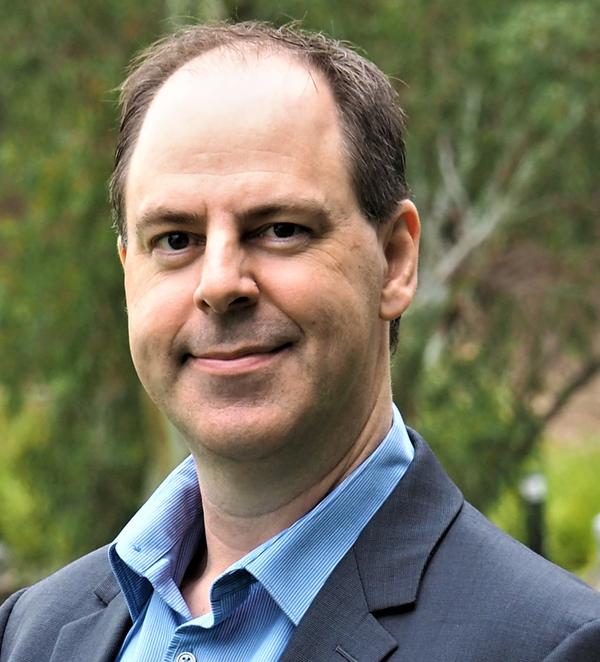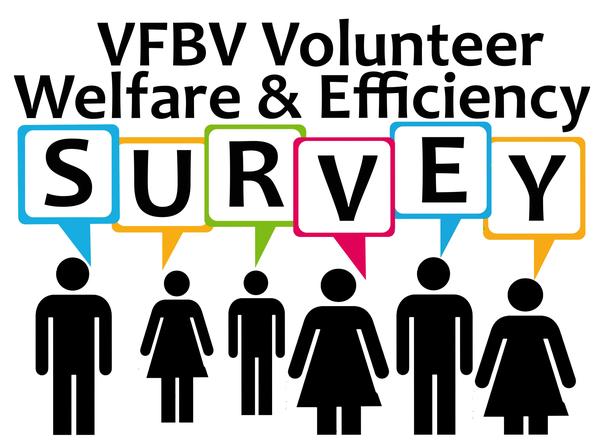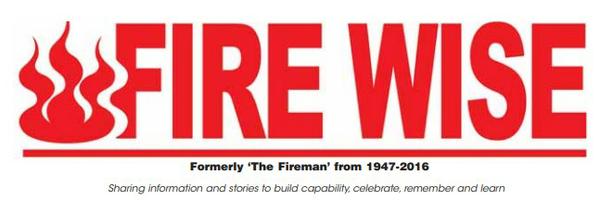Newsletter - November 2024
Dear , Welcome to our monthly newsletter. You can find a print version of this months articles on Page 2 of the November edition of the 'Fire Wise' newspaper. You can modify your subscriber details by following the 'Subscriber Options' link at the bottom of this email. |
Editorial: Cancer support
By Adam Barnett, VFBV Chief Executive Officer |
This month I wish to shine a light on work that largely goes unseen and unrecognised, but that none the less makes a really big
difference to those who need to avail themselves of this support from VFBV. A little like insurance, people often do not realise how important this support is until they need it the most. And while we hope no-one will ever need it, the sad reality is some of our members will be diagnosed with cancer, thought to be a direct result of their cumulative exposures over the years as a volunteer firefighter.
Victorian law currently recognises 15
presumptive cancers that have been scientifically proven to be associated with the carcinogens and toxins that firefighters are exposed to when fighting fires. VFBV continues to advocate for the expansion of the scheme. Other jurisdiction have revised their schemes with updated medical evidence and added additional cancers. QLD for example cover 22 cancers, while Tasmania covers 21. You will find a comparison table of all Australian States and Territories on our website.
The Victorian legislation covers CFA volunteer firefighters, FRV career firefighters, Forest firefighters employed by FFMVic and fire agency vehicle and equipment maintenance employees.
Under the presumptive scheme, a firefighter is generally not required to prove the cancer was caused by their firefighting provided it is one of the 15 cancers listed under the legislation and that the minimum eligibility/qualifying requirement is met for the specific cancer. The qualifying period (years of service as a firefighter) ranges from 5 years to 25 years depending on the type of cancer.
It is called a rebuttable
presumption, meaning that while the firefighter is not required to prove the cancer was caused by their firefighting and therefore it is presumed, the insurer is allowed to rebut that presumption and pursue an alternate cause, however the onus is shifted to the insurer to have to prove what they think the other causes are.
However, the Victorian legislation contains a quirk that is not found in the majority of other Australian state and territory
presumptive schemes. Under the Victorian legislation, the presumption only applies if the “injury” (which is usually the date of diagnosis for cancer) occurs during the period you are considered a firefighter, or within 10 years after you cease to serve as a firefighter.
As members would recall, presumptive rights compensation was very hard fought for over a long period of time by both career and volunteer firefighters. The Victorian legislation was
controversial in the sense that it was tied to other controversial reforms to the fire services that had nothing to do with presumptive rights, but also because it created an additional hoop that Victorian volunteer firefighters need to progress through before their claim is even considered, which does not exist in any other State or Territory.
This extra hoop is by way of a special “Advisory Committee” which is established by the Minister -
whose purpose is to provide an ‘expert opinion’ on whether a volunteer firefighter has attended fires to the extent reasonably necessary to fulfil the purposes of service as a firefighter under the presumptive legislation.
And while VFBV and other parties raised serious concerns around this element of the legislation pointing to the fact that no other State or Territory uses this approach - the government at the time refused all requests for
amendment.
For these reasons, VFBV has been monitoring very closely each case that has progressed through the presumptive rights scheme to understand the impact of the advisory committee and whether it was having any negative impacts or unintended consequences.
Earlier this year, a volunteer was in fact rejected from presumptive rights based on the opinion of the advisory panel that they had not
attended fires to the extent ‘reasonably necessary’.
What made this case unique, was the advisory panel had interpreted the requirement for the date of diagnosis to fall within 10 years of their ‘firefighting’ service as a minimum eligibility requirement, and since, in the opinion of the committee, that this member was now in a ‘non operational’ role and CFA had not recorded any attendance to a fire in the last 10 years that they no longer
qualified.
What made this decision so shocking, was the fact that CFA’s records were incomplete, none of his recent turnouts were recorded because he had been incorrectly classified in RMS as non-operational, and this supposed ‘non-operation’ role routinely was deployed to the fireground. Even worse, this was a highly decorated firefighter, with close to 50 years of service, and who had attended hundreds if not thousands of incidents over their
lifetime including extensive deployments during Black Saturday and Ash Wednesday. The very person presumptive rights was expected to cover.
This new inappropriate interpretation of the 10-year requirement to a current serving member is further highlighted when you consider the minimum qualifying periods for some of the cancers. For example, primary site oesophageal cancer requires a qualifying period of 25 years. Under this new interpretation,
despite a current volunteer having met the 25 year requirement attending fires, if they hadn’t been to what the advisory committee determine to be a sufficient number in the volunteer’s last 10 years of service (for example years 25 – 35 of their service) despite attending thousands of fires prior - then this member’s entire service history could be ignored.
All this despite cancer not magically appearing on an exact timeline. For the scheme to
assume it does is deeply flawed, and we believe tying the sunset clause with the attendance criteria is an unintended consequence of the construction of the legislation which simply added volunteers to the scheme as an afterthought. To think a long serving firefighter could be excluded from a system simply based on their last 10 years in a lifetime of service is just plain wrong.
We do not believe this was the intent of the 10-year ‘sunsetting’
period. And while we didn’t agree with it existing in the first place, it was always described to us as meaning the presumption would end 10 years after a firefighter left the service or retired. But to think it being used to exclude a current serving volunteer with decades of service to their community is very distressing. This magical 10-year period does not apply in most other State’s or Territories either.
Fortunately, in this case, we were
able to demonstrate significant errors which allowed for this member’s case to be reevaluated. However, this and other recent cases have highlighted some recurring issues that are now forming a pattern, and that we are now seeking to educate members on.
For example, the accuracy of
CFA’s service records and incident attendance continues to be a significant barrier. As a result, we highly recommend that members request their records from CFA before they submit a claim, to ensure you have the time to correct those records and fill in any gaps.
CFA will also not supply any other records from other services. So if you have service history with another fire service, either within Victoria or elsewhere, it is important you
request those records from the respective agency first, so we can help you combine them with your CFA records.
It is also important to consider any significant events that might be missing from your service history. This is where brigade records may be more accurate than those stored on RMS or FIRS, especially historical records.
My main advice for anyone who is pursuing a presumptive legislation
claim is to ensure you get in touch with VFBV so we can assist you with the process. The WorkSafe process can be very daunting for a volunteer, and the various forms and paperwork can be very confusing for CFA volunteers in particular, as some sections require you to document your private employer, whereas other sections assume that CFA is the employer in terms of your firefighting.
We now have extensive experience assisting volunteers through
this process and can help you with all the relevant forms and processes.
We are also engaged in constructive discussions with government on some of the issues confronting volunteers as they navigate the presumptive scheme, and I remain hopeful that common sense amendments may be considered. We’ll keep working on ensuring the system is working as intended and will keep you apprised of progress.
NEW CFA CEO
In mid-October, CFA announced the appointment of Greg Leach AFSM as the new CFA Chief Executive Officer. Greg is well known to VFBV from his time with CFA where he originally joined as a volunteer in 1978, before applying to be a career firefighter. Greg went on to serve in senior roles within CFA, before broadening his horizons with senior roles with Ambulance Victoria
and the MFB. He recently served as Commissioner for QFES in QLD, before returning to Victoria last year where he was appointed as the CEO for SES Vic.
On behalf of volunteers and VFBV I welcome Greg home, and look forward to working closely with him and Chief Officer Heffernan over the coming years as we continue to strengthen Victoria’s most trusted and respected community fire service.
I would
also like to extend my thanks and admiration for Robyn Harris who has acted as CFA’s interim CEO following the departure of Natalie MacDonald back in July. I have enjoyed working with Robyn and thank her most sincerely for her service. The interim gig is always a tough ask, but I am confident CFA has been well served under her leadership. |
The 2024-25 annual VFBV Volunteer Survey is now open.
The survey is an annual snapshot of volunteer opinion, using questions on issues chosen by CFA
volunteers. All responses are confidential and de-identified results go straight to decision makers. By taking part in the survey you help us make a difference in CFA.
The survey measures volunteer opinions on what is important to them and how well CFA is performing according to what they are experiencing.
The gap between the measurement of importance and performance is referred to as the Volunteer Welfare and Efficiency Level (VolWEL) outcome. This measure helps to identify
volunteer dissatisfaction and where priority attention should be directed by CFA and Government.
Scan the QR code below or click here to take part in the survey today.
Paper copies of the survey are also available by calling the VFBV office on (03) 9886 1141.
|
Our expressions of interest process will open shortly for volunteers to nominate to the CFA/VFBV Joint Committee’s for the 2025 calendar year.
If you
feel you can contribute and have the time, are passionate about one of the eight streams and want to be an integral part of our Joint Committee process – then please visit our website or talk to your local VFBV State Councillor or VFBV Support Officer for a nomination
form.
Nominations are due 25th November 2024.
We are seeking volunteers from broad and diverse backgrounds to participate in our consultative structures. Young members, women and members of culturally diverse backgrounds are highly encouraged to nominate. If you would like to learn more about what the role entails and how to get involved, please contact your local VFBV Support Officer, State
Councillor or Executive Officer Mark Dryden.
CFA has recently released another 17 revised SOP’s for volunteer feedback and consultation. Given recent controversy, we are prioritising SOP’s related to Electrical
Safety and electrical infrastructure.
Given the importance of SOPs in CFA’s operational doctrine, VFBV encourages all senior volunteers to make themselves familiar with the proposed changes and provide feedback ASAP.
Please visit the VFBV website to access drafts and change logs to help guide your
feedback.
Position Vacant - VFBV Support Officer (North East) |
VFBV is seeking to appoint a VFBV Support Officer to work in regional Victoria with VFBV District Councils, Brigades and volunteers to facilitate consultation,
issues resolution, delegate support and volunteer engagement.
The position is a state role, with emphasis and focus on providing support throughout CFA’s North East region (CFA Districts 12, 13, 22, 23 and 24).
This is an existing position, with the incumbent to depart shortly. In addition to relevant skills and experience outlined in the position description, candidates will need to understand CFA and volunteerism, be good listeners; be able to facilitate good
consultation; ability to establish productive networks; navigate through complex issues resolution; be self-starters; have the ability to work remotely and have a passion to improve arrangements that benefit the welfare and efficiency of CFA volunteers.
Extensive travel is required and flexible work base locations will be considered for the position, with the priority focus to assign a work location within the CFA North East Region. Flexible working arrangements, to cater for
extensive evening and weekend work, will be tailored to match the needs of our volunteer membership base. This is a full time position.
Prior to applying you should familiarise yourself with the Position description which is available from the VFBV website.
Applications
close on Monday 9th December 2024.
Following the October AGM, the VFBV Board has held its annual elections. Samantha Collins has been re-elected State President, Howard Smith has been elected as State
Vice President, and Libby Hay has been re-elected as Treasurer.
The Board also welcomed Kelvin Bateman to the Board, who was appointed following the retirement of Greg Walcott, who was presented with VFBV Life Membership at this year’s AGM.
Kelvin is Captain of Dunrobin- Nangeela Fire Brigade in District 4, and is also a Deputy Group Officer with the Casterton Group. Kelvin is passionate about improving volunteer amenities and has been a strong advocate for new trucks,
fit for purpose fire stations which can house current vehicle typology and improvements to volunteer health and safety.
State Council also held elections for the two ex-officio members who are appointed by State Council for a one-year term to the Board, with Graeme Jilbert (District 18) re-elected, and Andy Cusack AFSM (District 4) elected as a State Council nominee following Howard Smith’s appointment to the Board.
The Minister for Emergency Services the Hon Jaclyn Symes has announced the successful projects for the Volunteer Emergency Services Equipment Program (VESEP)
2024/25.
VFBV would like to congratulate the 179 brigades and groups that have been successful in this round of VESEP.
CFA brigades and groups will share in $11 million dollars’ worth of co-funding for projects and initiatives from the annual grants program which helps fund much needed new and upgrades to operational equipment, vehicles and appliances and minor facility improvements for brigades and groups in every district across the state.
To any brigade
or group who was unsuccessful in this year’s allocation, it is recommended you contact your District office to ascertain what improvements could be made to your application and prepare your submission early for the next round of grants.
Congratulations to all the successful brigades and groups. |
Fire Wise - November 2024 online only edition |
The November 2024 edition of Fire Wise has been published online only, this edition and past editions are available from the Fire Wise website.
You can support Fire Wise and the role it plays as an independent voice in keeping volunteers informed by becoming a subscriber. To become a subscriber visit the Fire Wise website or contact the Managing Editor of Fire Wise, Gordon Rippon-King either by phone 0402
051 412 or email gordon@fire-wise.com.au |
Please update records with Fire Wise |
Newly elected Group Officers, Group Secretaries, Brigade Captains and Brigades Secretaries are asked to update their physical and email addresses with Fire Wise as
soon as possible so future editions, both printed and electronic, can be forwarded to the correct person, at the correct address.
If the September edition of Fire Wise has gone to previous officers please advise by email or telephone of the name, physical and email address details of the new officer in your place so our database can be updated.
Existing Group Officers, Group Secretaries, Brigade Captains and Brigade Secretaries are requested to provide their email address, if
they haven’t already done so, to enable future electronic editions to be forwarded.
VFBV District Presidents, District Secretaries and State Councillors, as well as all brigade and individual subscribers, are requested to send their email address if not already receiving digital editions.
Please include the Group or Brigade you belong to and the office held, and forward this information to Fire Wise by email to gordon@fire-wise.com.au or by telephone on 0402 051 412.
A complimentary copy of Fire Wise, courtesy of VFBV, is sent to each of these officers monthly.
Eight editions per annum are electronic (January, February, April, May, July, August, October and November) and the other four (March, June, September and December) are printed. The printed editions include the VFBV Quarterly Supplement.
Your email addresses will only be used to forward electronic
editions.
Your assistance is appreciated in helping us get Fire Wise to the intended people in the quickest amount of time. |
Recent articles on the VFBV website
|
Enjoy the VFBV monthly newsletter?
|
If you enjoy reading the VFBV newsletter each month, why not share it with your fellow volunteers?
Either forward this email to others who may enjoy the articles or encourage other volunteers to sign up to receive their own copy each month here.
Download the latest Joint Committee Two
Minute Briefings here. |
|
|
VFBV
9/24 Lakeside Dr
Burwood East VIC 3151
| |
|
|
|
|
|
|







